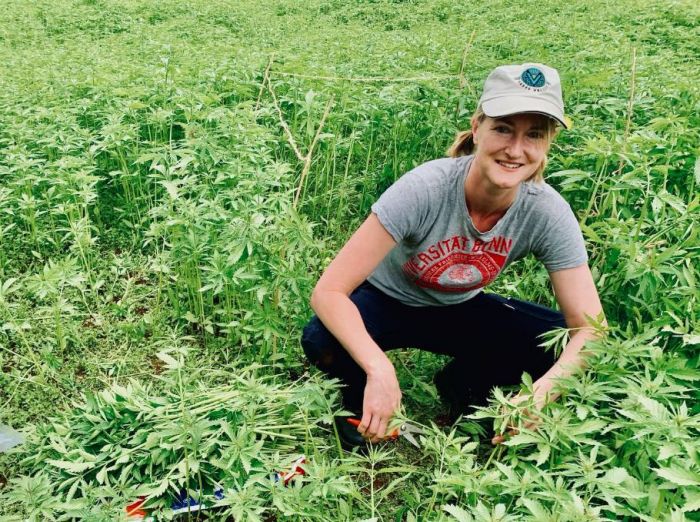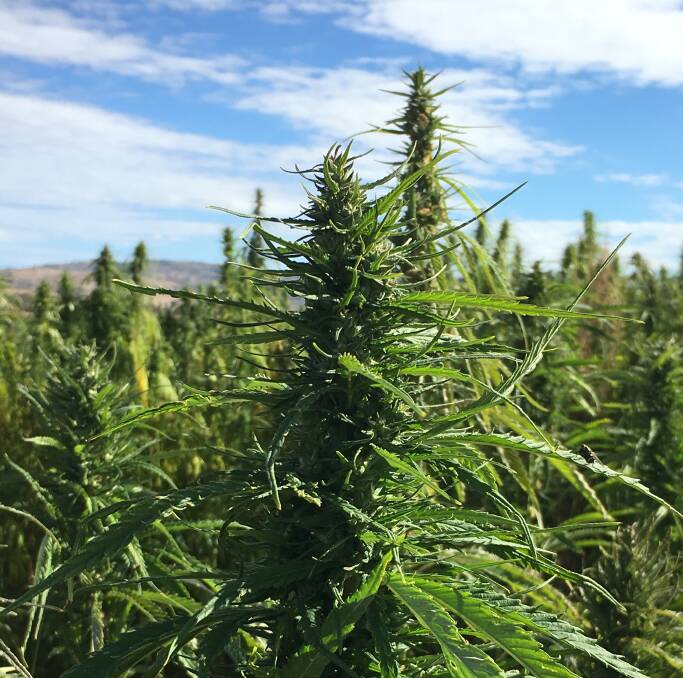You are here
Home 🌿 Marijuana Business News 🌿 Scientists look to feeding 'weed' to sheep and not make them dopey 🌿Scientists look to feeding 'weed' to sheep and not make them dopey

Scientists are trying to find a cannabis plant which does not make sheep high.
Or at least making sure the eating of their flesh does not pass on those famous traits if they have been grazing on it.
Already trials in Western Australia and New South Wales found industrial hemp has shown promise as a summer crop for livestock such as sheep and cattle.
Scientists have been feeding cannabis from WA to a trial flock of 15 Merinos in NSW to discover how much of the psychoactive compound which induces the high ends up in their meat.
Now it is thought the remnants of the harvested crops will be handy feed for livestock.
The trick is to make sure the crop no longer contains Tetrahydrocannabinol or THC which produces the illicit chemical response.
THC is still considered a contaminant in supplied animal products unless food regulators set a safe allowed level.
Due to a lack of data no maximum level has yet been set meaning the current maximum acceptable level of THC in food coming from animals is zero.
Researchers believe in temperate mixed-farming systems hemp may provide green feed for ruminants in late spring/early summer.
This may offer valuable green feed at the critical time of joining and for weaner growth and survival.
Alternatively, the stubble may be grazed after the crop is harvested for seed/fibre.
The "Opening the gates to hemp grazed livestock in Australia" pilot was led by the Department of Primary Industries and Regional Development and funded by AgriFutures Australia, in collaboration with the ChemCentre and Charles Sturt University.
Results from the first phase of the project has sparked further research to explore the nutritional value and ways to meet market regulations for the possible forage crop.
Grazing livestock on hemp crops could lead to the accumulation of THC from the hemp plant in the animal's tissues and detectable levels could transfer to meat, milk or other animal products.
DPIRD project lead Bronwyn Blake said pilot experiments on Merino wethers showed there were no adverse effects on feed intake or animal performance from consuming hemp stubble.
Rather, Dr Blake said the results suggested production gains could be attained from sheep fed industrial hemp.
"The 15 sheep in the house-based study in New South Wales were fed hemp pellets made in WA from the industrial hemp variety Morpeth Late, which was selected based on its slightly higher THC content to push the parameters," Ms Blake said.
"The sheep were fed three diets and five replicates per treatment and measured for digestibility, performance and carcase traits over a period of 56 days.
"The experiment showed the digestibility of dry and organic matter were higher for both hemp diets compared with the control, though it is not clear why.

"The most profound outcome was the increase in minor volatile fatty acids, suggesting an improvement in energy availability and a change in the composition of the gut microbial population, which may account for the improved digestibility."
While THC was detected in all measured tissues at extremely low levels, which would not meet regulatory requirements, Ms Blake said the results were still encouraging.
"The results suggest there is plenty of scope to develop management practices for feeding hemp biomass to ruminants, like sheep, goats and cattle, which may meet regulatory requirements for zero THC levels in animal products," she said.
The project has progressed to phase two to investigate the pathways to market for livestock fed hemp, including clearance rates for THC.
The WA department scientists say they "are not currently aware" of any suitable research on how to feed hemp containing THC to food-producing animals in a way which avoids THC transferring into animal products.
Ms Blake said she was excited about the next phase of the project, which could generate opportunities to use the whole hemp plant as a forage feed option for livestock.
"Phase two will provide valuable insight into the half-life, or breakdown, of THC in sheep and cattle and how long it takes for THC to be eliminated from various tissues in animals fed industrial hemp," she said.
"Ultimately, this research will provide the foundation from which an industry code of practice could be developed to feed hemp forage to ruminants and create an opportunity for this useful, diverse crop to be integrated into the whole farm business."
420 Intel is Your Source for Marijuana News
420 Intel Canada is your leading news source for the Canadian cannabis industry. Get the latest updates on Canadian cannabis stocks and developments on how Canada continues to be a major player in the worldwide recreational and medical cannabis industry.
420 Intel Canada is the Canadian Industry news outlet that will keep you updated on how these Canadian developments in recreational and medical marijuana will impact the country and the world. Our commitment is to bring you the most important cannabis news stories from across Canada every day of the week.
Marijuana industry news is a constant endeavor with new developments each day. For marijuana news across the True North, 420 Intel Canada promises to bring you quality, Canadian, cannabis industry news.
You can get 420 Intel news delivered directly to your inbox by signing up for our daily marijuana news, ensuring you’re always kept up to date on the ever-changing cannabis industry. To stay even better informed about marijuana legalization news follow us on Twitter, Facebook and LinkedIn.




